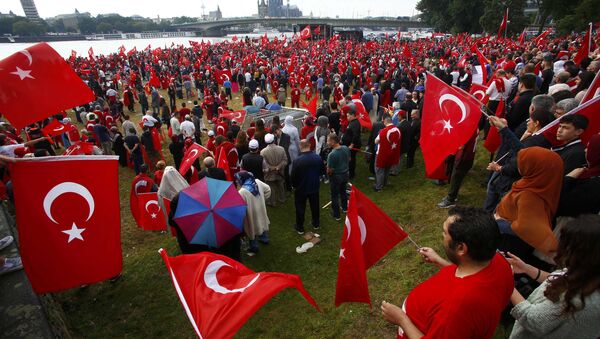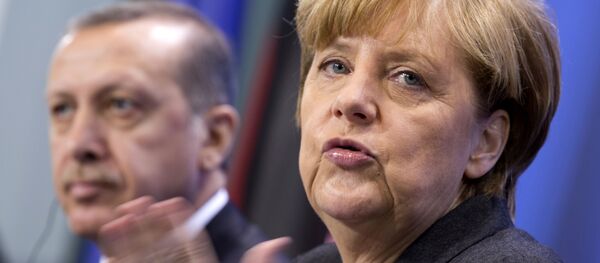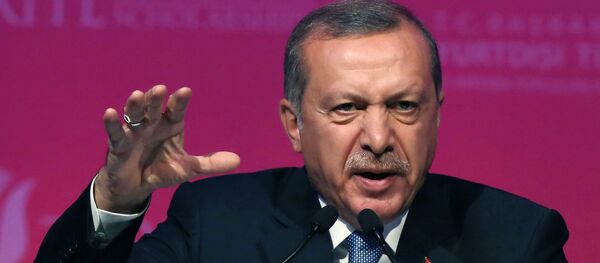MOSCOW (Sputnik), Victoria Mladenovich — Relations between Berlin and Ankara became strained after Turkish-German journalist Deniz Yucel was arrested in Istanbul in February over alleged links to a terrorist organization and terrorist propaganda.
According to the chairman of the Turkish organization Demokratik Isci Dernekleri Federasyonu (DIDF, or the Federation of Democratic Workers’ Associations), Zeynep Sefariye Eksi, the tensions between the two countries “will lead to damaging consequences mostly for the migrants of Turkish origins living in Germany.”
Similarly, the chair of the Turkish Community in Germany (TGD) association, Gokay Sofuoglu, noted that it is “the Turkish people in Germany and the Germans who will later have to deal with the consequences [of the bilateral conflict] and overcome them.”
Reasons Behind Erdogan's Campaign in Germany
Around 3 million migrants of Turkish origin currently live in Germany, with around half of them being Turkish citizens and thus eligible to vote in the April 16 referendum on constitutional change in Turkey. According to DIDF leader, much of the Turkish diaspora in Germany opposes Erdogan’s nationalism.
“It is well documented that majority Kurdish, Alevite, secular and progressive people of Turkish origin that live in Germany are against Erdogan. This is the reason for the start of the referendum campaign in Germany before Turkey. In an attempt to create a base for the propaganda that Western countries are anti-Turkey, Erdogan is attempting to escalate arguments between Turkey and the EU and Germany in a calculated, provocative way,” Eksi said.
According to the TGD chair, however, Erdogan indeed polarizes the mood in Germany as “he always used to do in the past and then later apologized to everyone,” but that is why, in Sofuoglu’s view, “no one is taking him seriously.”
Germany's Official Reaction Development
The German government initially condemned Erdogan’s Nazi remarks as unacceptable, unjustifiable, uncalled-for and absurd.
On March 8, however, German Foreign Minister Sigmar Gabriel stated that open and friendly relations with Turkey remain Germany's objective.
Similarly, while TGD’s head hailed the German government’s temperate response as appropriate, insisting that “one should not allow oneself to be put on the same low level, ” the DIDF leader criticized the way Berlin handles Ankara and suggested their manner of diplomatic treatment led to Erdogan’s Nazi remarks in the first place.
“In line with its foreign political calculations Berlin has been following a conciliatory and supporting policy towards Erdogan so far, and its criticisms of Erdogan were a result of public pressure but limited and symbolic. In other words, Germany is reaping the harvest that it had sown in a way,” Eksi noted.
Future Development
In the aftermath of Erdogan’s Nazi remarks, the German head of the Federal Chancellery, Peter Altmaier, said on Wednesday that the German government reserves the right to ban any Turkish politician from entering the country, thus strengthening German position toward the Turkish official rallies.
Nevertheless, according to Eksi, the long term prospects of German-Turkish relations are not in danger, as the two countries are dependent on each other despite the current differences.
“The two countries need each other. There are 6,500 German companies operating in Turkey. And Germany has its own plans for the region via Turkey. Also, last year Turkey was the 8th largest buyer of German arms. All this shows that despite ongoing political frictions, the relations between Germany and Turkey could not deteriorate quite easily,” Eksi noted.
Furthermore, according to Sofuoglu, the German-Turkish diplomatic conflict is only temporary in nature, as is it “well-known that Erdogan’s current efforts are maneuvers oriented towards the [success in the] referendum.”
So far, the Netherlands and Austria have joined Germany this month in banning campaign rallies by Turkish ministers who wanted to drum up support for giving Erdogan more executive powers, triggering aggressive comments from Ankara.
On Thursday, French President Francois Hollande expressed Paris solidarity with affected countries.





